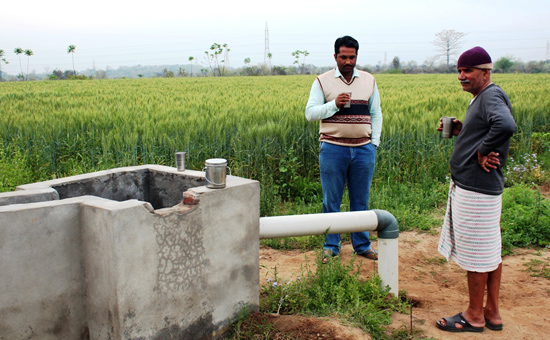-
Article has suggestions for BJP on how to effect change, written in the context of Farm Bills. Actually these learning's have larger application.
Be it the corporate world or government effecting change is difficult. Remember Ratan Tata’s battles with Rusi Mody etc when he sought to give all Group companies a common identity amongst others.
Status
quo creates vested interests, Punjab is no different. There is a political
angle to these protests, if only the government was pro-active! Read This
is about politics, not farmers rights
Those who
believe that the Centre should have spoken to farmers before introducing the
farm bills are mistaken. This is an all India and not Punjab specific bill.
Farmers fail to see that Punjab needs a second green
revolution. Do they know that, according to a
draft report of the Central Ground Water Board (North-Western region), Punjab
will be rendered a desert within 25 years if the exploitation of its underground
water resources continues at the current rate. Source
Farmers must realize that in a dynamic world anything ie frozen becomes
irrelevant.
Next
Indian governments do not have a tradition of speaking with people of India before
affecting change. Did Narasimha Rao do so before introducing 1991 reforms? Or
did Sonia Gandhi also speak to the states before introducing the Right to
Education Act?
Note that in a democracy people elect leaders to take decisions in the country’s interest. If the decision is anti-people the government is voted out.
In the U.K, former Prime Minister David Cameron forgot this when he called for Brexit–referendum. Public voted for exiting the European Union without knowing the pros and cons of being part of EU. This information and intellect, an elected government is supposed to have.
Having
said that, it is incumbent on the management or government to convince
stakeholders on the need for change and the quality of their ideas.
Here the Centre could have done better for eg has it told
citizens that the gap between the outstanding Cash Credit Limit (provided by
Banks to state government to fund procurement) and value of physical stocks
with agencies was Rs 31,000 crores. Source Tribune2017
Reform
markets to energise agriculture
Or that large farms in Punjab are also managed by a Thekedar (a contractor) who takes a theka (contract) of growing
produce with farmer receiving net proceeds (no incentive to compete or change) or the current system allows rice/wheat from U.P./Bihar to
be sold in Punjab/Haryana mandis and shared a report comparing quality of wheat
procured in Punjab vs M.P.
 Farm in Punjab. Groundwater depletion is a problem.
Farm in Punjab. Groundwater depletion is a problem.
So how could the government have effected change?
Through numerous articles (English and Punjabi) the Centre could have built a case for change. They could also have exposed the politician-buying agent-Mandi boss nexus. The problem is a strong perception that the state government wants status quo–vote bank politics. Knowing this the Centre should have-
Formed a
Crack Team of communication experts and those with domain knowledge. Focus on
factual data and local insights. Another team tracks comments on social
media. The team should include the
minister for agriculture, Spokespersons and leaders from Punjab.
Two, before
passing the ordinance the Centre could have prepared a FAQ (frequently asked
questions) on why bill, key provisions, proposed benefits esp. additional
income to farmers, farmer queries, how they would be addressed and parties who
would be affected negatively and how. It must give financial impact of demands for
e.g. making minimum support price a legal right.
The FAQ
is also a way to double-check reasonableness of the bills proposals. Thus, the
FAQ provides answers to most questions. The trick is anticipate questions. This
FAQ should be bounced off with a Senior Editor for critical feedback.
I
remember that in Hindustan Levers before every Annual General Body Meeting, a
management trainee was asked to prepare an FAQ on possible shareholder
questions. This way every answer was invariably a few seconds away.
The FAQ
should be should be updated daily and shared with crack team.
The
communication should be in English, Hindi and Punjabi. Writers can publish
articles in these languages, print and online. The FAQ should be sent Indian
Embassies in U.K. and Canada where Sikhs are a vote bank.
This process
prevents misinformation, makes all speak in one voice, exposes protestors and
unreasonableness of their demands. Having a good idea is great, but it has to
be sold, only then will there be a buy-in by stakeholders.
Since there
is a possibility of foreign governments trying to inflame emotions, the
Ministry of Home Affairs must track protests 24 by 7. The MHA could identify
key protestors in advance and share FAQ. Ditto with public influencers.
In short,
what is required is a vigorous outreach program. BJP does a good job during
elections. It needs to replicate the effort whilst effecting change. For how long can BJP depend on its supporters to defend
its moves?
Nevertheless,
some may still protest with an intent to create public unrest or for political
reasons. The government must check if such protestors are Indian citizens and
their income-tax returns. If they are in business what is the legal structure?
Has their company received foreign direct investment or foundation donations
from abroad plus have they incorporated business entities outside India?
This way
the government can be on top of the situation. It also prevents derailing the
key issue for e.g. some have converted the farmer issue into a Hindu-Sikh one.
Since
India has to affect significant change it might be useful if the government
puts IAS officers and Politicians through Change Management Programs.
First
published in Financial Express and here
Also read
1. Agriculture,
Bills of Change
2. Do
not kill the second Green Revolution
3. Free
power to farmers causes pollution in NCR
4. Ideas
to clear the Food Corporation of India mess